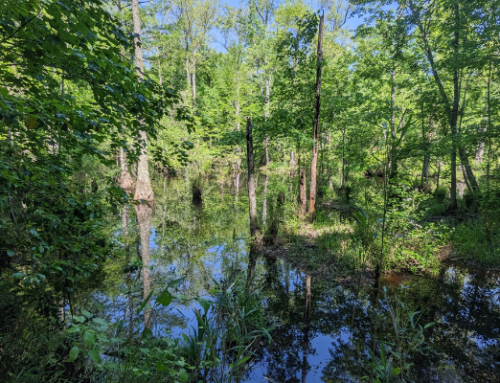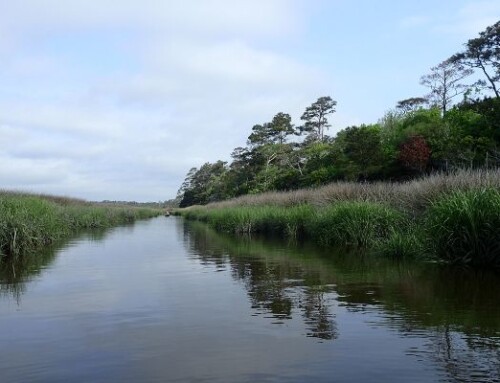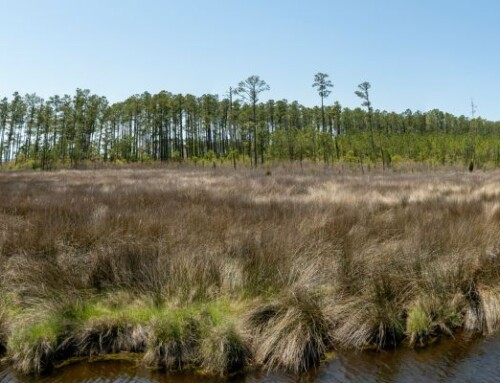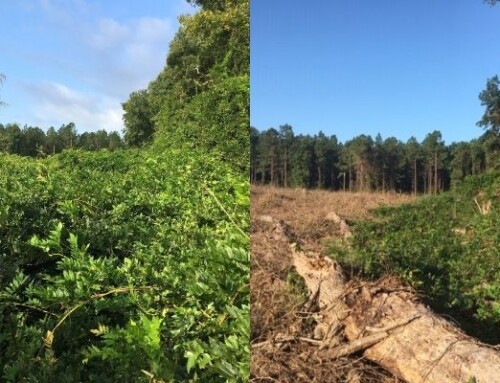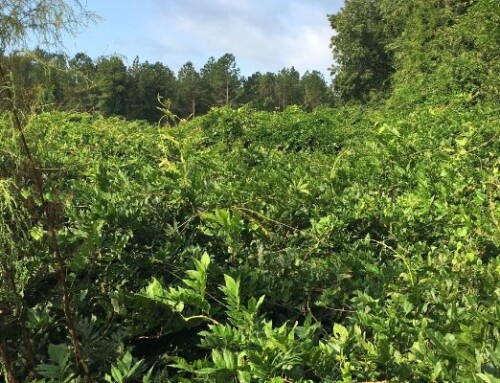North Carolina Coastal Land Trust recently protected a new state natural heritage area with the purchase of 16.86 acres along the Chowan River south of Colerain in Bertie County.
“Discovered” by Dr. Stan Riggs, coastal geologist and professor emeritus at East Carolina University, and Mr. Tom Earnhardt, host and co-producer of UNC-TV’s Exploring North Carolina, the property at Point Comfort is a prominent landmark on the Chowan River rising approximately 85-90 feet above the water below. Dr. Riggs believes these bluffs are the highest point directly above sea level in the North Carolina coastal region.
Dr. Riggs explains that the bluffs on the property are part of the Wicomico Terrace, an old ocean shoreline dating as far back as the Pleistocene era which ended about 12,000 years ago. Layers of clay, sand, quartz, ironstone, limestone, and marine fossils have been deposited over time creating visible layers of color and texture on the east-facing bluff. “These geologic layers tell incredible stories about the history of changing climates and sea levels over many millennia,” states Dr. Riggs, “from a scientific point of view, there is tremendous value in preserving these incredible bluffs.”
In addition to its unique topography and geological value, Dr. Riggs and Mr. Earnhardt believed the property also hosts a unique coastal forest ecosystem of large white oak, American beech, and holly rarely found on the North Carolina coast. Mike Schafale, ecologist with the North Carolina Natural Heritage Program, heartily agrees. During an April 2023 site visit, Mike explored the property documenting mesic mixed hardwood forests of American beech, loblolly pine, and northern red oak, as well as swamp forests of bald cypress, American elm, red maple, swamp tupelo, and green ash in wetlands along a small stream running through the property. An empty mussel shell collected on the beach below the bluffs was later identified as a tidewater mucket (Leptodea ochracea), one of the rare freshwater mussel species found in the Chowan River. For Mike, the forest community growing along the cliffs and ravines tipped the scales to make this site rank as a new state natural heritage area, named the Chowan River Point Comfort Bluffs, considered to be of exceptional ecological significance (the highest classification).
Standing on top of the bluffs looking across the wide expanse of the Chowan River, it is not hard to imagine Native Americans like the Chowanoke using the bluffs to watch for incoming friend or foe, or to spot river herring coming up the river to spawn. Native Americans, and later early settlers, depended on the river for its bounty. Indeed, for many years, the herring fishery on the Chowan was legendary. In a June 2021 Coastal Review article, North Carolina historian David Cecelski stated, “From the late 1700s until nearly the end of the 20th century, the river was home to one of the largest commercial fisheries for river herring in the U.S. Some say it was the largest in the world for a great part of that time. Local fishermen once caught millions of tons of herring a year on the river. In a five-year period, between 1878 and 1883, a single fishery on the Chowan River harvested 15 million herring.” While the commercial river herring industry has died, recreational fishing on the Chowan River remains important. According to N.C. Wildlife Resources Commission, “Some of the finest freshwater fishing in the state can be found in the Chowan River. Largemouth bass are the most sought-after freshwater sport fish in the river, and tournaments are often held throughout the river at many of the access areas.” For boaters, fishermen, and others enjoying the Chowan River, the bluffs at Point Comfort will remain undisturbed and continue to stand guard over the river due to the Coastal Land Trust’s purchase of the property.
“The Coastal Land Trust is ever thankful to Dr. Stan Riggs and Mr. Tom Earnhardt for bringing this site to our attention, and assisting us by sharing their extensive knowledge of the history and geology of the area and their infectious enthusiasm about its uniqueness and significance to raise the necessary funding to purchase the property,” stated Lee Leidy, Attorney and Northeast Region Director for Coastal Land Trust. “The Point Comfort property will be managed as a nature preserve and will be forever protected from development,” she added. Coastal Land Trust also wholeheartedly thanks the U.S. Fish and Wildlife Service, Mr. and Mrs. Fred Stanback, and other generous private donors who provided funds for the purchase of the property.

A view of the bluffs and the Chowan river from above.

Stan Riggs and Tom Earnhardt


